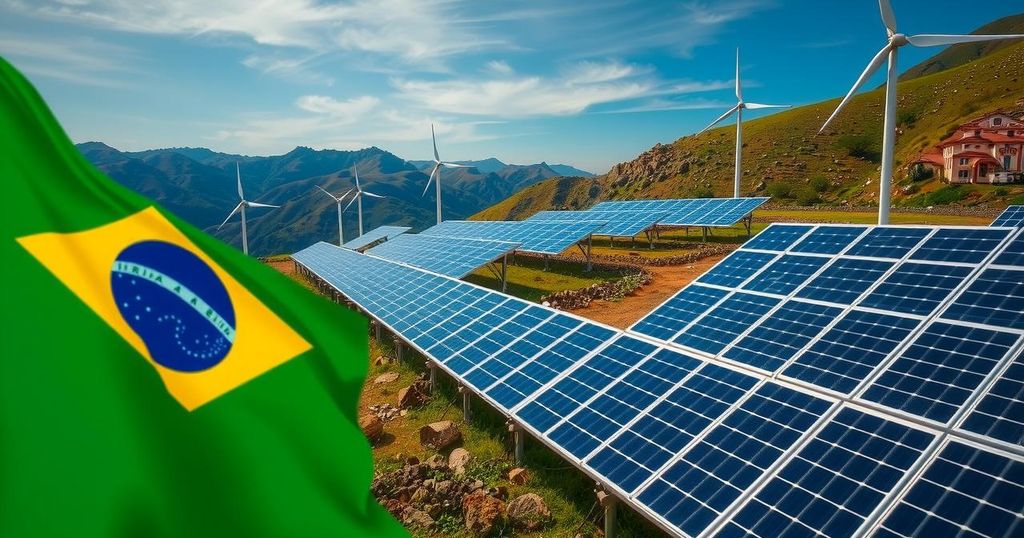China-Brazil Green Cooperation Advances Renewable Energy Initiatives

China and Brazil have enhanced their green energy cooperation with projects like the Panati photovoltaic power station in Ceara, which supports over 350,000 households. Initiatives like the Belo Monte transmission project and significant growth in electric vehicle sales exemplify this collaboration’s effectiveness in advancing sustainable energy solutions.
On November 18, 2024, it was reported from Beijing that the Panati photovoltaic power station in the Ceara state of Brazil, featuring 446,000 solar panels, was inaugurated through investments by the Chinese State Power Investment Corporation (SPIC). Spanning 840 hectares, this facility began operations in June 2024 and now supplies clean energy to more than 350,000 households each year. The Brazilian government has made significant strides in promoting a transition to green energy, establishing clean energy collaboration with China as a pivotal area of focus. The State Grid Corporation of China completed the first and second phases of the Belo Monte ultra-high-voltage transmission project in 2017 and 2019, respectively. This project is crucial for channeling Brazil’s abundant hydroelectric resources from the north to the densely populated southeastern region. Additionally, in December 2023, the State Grid Corporation received franchise rights for another ultra-high-voltage direct current transmission project, which will facilitate the transportation of renewable energy sources like wind and solar power to major urban areas, including Brasilia. Brazil is witnessing a surge in green power initiatives, with electric “highways” extending across its great landscapes. Scholar Felipe Camargo Gaiotto emphasized that while Brazil excels in hydropower development, China’s leadership in solar, wind energy, and electrical transmission enhances their collaborative potential for fostering global sustainable progress. As Brazil’s dependence on green energy grows, electric transportation is concurrently advancing, with a notable increase in Chinese-brand electric vehicles in metropolitan regions such as Sao Paulo and Rio de Janeiro. According to the Brazilian Electric Vehicle Association (ABVE), the sale of light electric vehicles in Brazil soared by 113 percent year-on-year, reaching over 120,000 units in the first nine months of the current year. Among the top-selling models, eight are from Chinese manufacturers. BYD, a prominent Chinese new energy vehicle producer, operates a battery production facility in Manaus, which signifies a milestone for local battery assembly and production capabilities, further boosting the adoption of eco-friendly technologies within the nation. An engineer from the facility remarked that this initiative is instrumental in the electrification of public transportation and the development of domestic new energy technologies.
Clean energy cooperation between China and Brazil has gained momentum in recent years, propelled by Brazil’s commitment to a sustainable energy transition. Brazil’s rich hydropower resources complement China’s expertise in solar, wind energy, and advanced electricity transmission technologies. Such collaboration presents an opportunity for both nations to enhance their renewable energy capabilities while contributing significantly to global climate goals. The Panati photovoltaic project and the construction of electric charging infrastructure are evidence of ongoing efforts to incorporate renewable energy sources into Brazil’s electricity grid. Additionally, the collaboration in electric vehicle production represents a growing partnership in advancing green technologies in public transport, further displaying the intertwined interests of both nations in promoting sustainable growth.
In summary, the recent developments in China-Brazil green cooperation illustrate a growing commitment to sustainable energy solutions. The establishment of solar power stations and advancements in electric vehicle production signify significant strides toward cleaner energy utilization. This partnership not only fosters economic growth for both nations but also contributes positively to global sustainable development efforts, demonstrating how collaborative actions can yield substantial benefits in environmental stewardship and energy security.
Original Source: www.cnhinews.com




